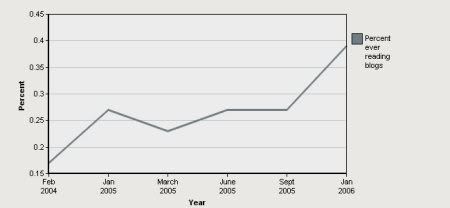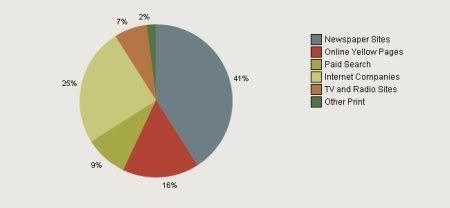nennt sich The State of the News Media 2007 (von der Columbia School of Journalism) und beinhaltet umfassende Daten und Fakten zu allen wichtigen Bereichen wie TV, Zeitungen, Online und Radio: Its goal is to gather in one place as much data as possible about all the major sectors of journalism, to identify trends, mark key indicators, note areas for further inquiry and provide a resource for citizens, journalists, and researchers.
Neben den klassischen Medien Zeitung, TV und Radio verzeichnen auch Online-Nachrichtenportale Rückgänge bei den Nutzern. Die US-Medienbranche ist von einer Krise bedroht: Zeitungen verlieren weiter an Auflage, die Zahl der Zuschauer der großen Fernsehanstalten sinkt, die Hörerschaft der klassischen Radiosender schrumpft. Selbst bei der Internet-Nutzung für Informationen gibt es Einbußen.
was mich doch ziemlich überrascht, dass der Anteil der Onlinenutzer, die auch Blogs lesen, so stark angezogen hat:

Neue Stellenangebote

|
Growth Marketing Manager:in – Social Media GOhiring GmbH in Homeoffice |
|

|
Studentische Unterstützung für Content Creation / Social Media (m|w|d) envia Mitteldeutsche Energie AG in Chemnitz |
|

|
Studentische Unterstützung für Content Creation / Social Media (m|w|d) envia Mitteldeutsche Energie AG in Markkleeberg |
im Onlinebereich teilt sich der Werbekuchen wie folgt auf (schade, würde mal gerne ne Trendgrafik sehen…):

aber im Großen und Ganzen trifft diese Überlegung den Nagel auf den Kopf und zeigt das ganze Dilemma der Newsbranche auf, die offline an Boden verliert, aber online nicht so richtig zum Verdienen kommen will:
Then there is another question, possibly even more baffling, to be sorted out — the idea that advertising works so differently online, the economics need to be rethought more completely.
The old journalism model of advertising was broadly based on audiences coming to look at content and staying to read or view the ads. Online, that connection is looser. When people visit the Web for news, they often do so in short bursts, with little attention to ads. Advertising online is more like the Yellow Page listings (except for big display and video ads). People are looking for a good or service or researching a topic. (That is the commercial essence of search, and it also applies to classifieds.) The poses little problem for online sites such as Yahoo or Google, in which search is part of the advertising structure. But it is a major issue for news sites, where ads are incidental to the reason people visit.
If that continues to be true — and some think targeted search will only grow — advertising may never grow to the point where it can pay for journalism on a scale to which we are accustomed. Those in journalism will need to develop a new economic model, not wait for this one to grow.







Das ganze Dilemma der Newsbranche, die offline an Boden verliert, aber online nicht so richtig zum Verdienen kommen will wird Katharina Borchert bald lösen …
[…] ok ok, lange genug gelabert, kommen wir zum Punkt. Ich hatte mich auf der DLD in München mit Tariq Krim (Netvibes.com Gründer) länger über mögliche Erweiterung des bisherigen Werbemodells im Netz unterhalten. Weg vom One Way hin zu einem gänzlich anderen Modell, das dem Kunden dient und weniger sich selbst. Kurz der Audio-Mitschnitt von Tariq aus einem Panel (”where are the editors”, 22.01., 5.45 PM, kein Direktlink zum Video, also srcollt mal) mit dem alles entscheidenden Satz (Artikelüberschrift) … i dont believe that advertising as a message has a future, i really believe that advertising is becoming a service und er hat damit prima zusammengefasst, wie ich Werbung im Internet sehe. Dazu passt übrigens auch recht gut die angesprochene Werbeeinnahmen-Problematik der Columbia School of Journalism, siehe vorherigen Artikel, letzte Abschnitt. […]
[…] Link (via Basic Thinking) […]
[…] Es sind keine guten Nachrichten, für alle die Nachrichten offline oder online publizieren und davon leben wollen. Robert Basic hat einige Informationen zur mißlichen Lage der News-Medien in den USA zusammengetragen. Zeitungen verlieren weiter an Auflage, selbst die Internet-Nutzung von News-Informationen geht zurück. Blog-Leser sind mit damit Schuld, sie lesen auf den Blogs oder via RSS, was andere geschrieben haben. […]